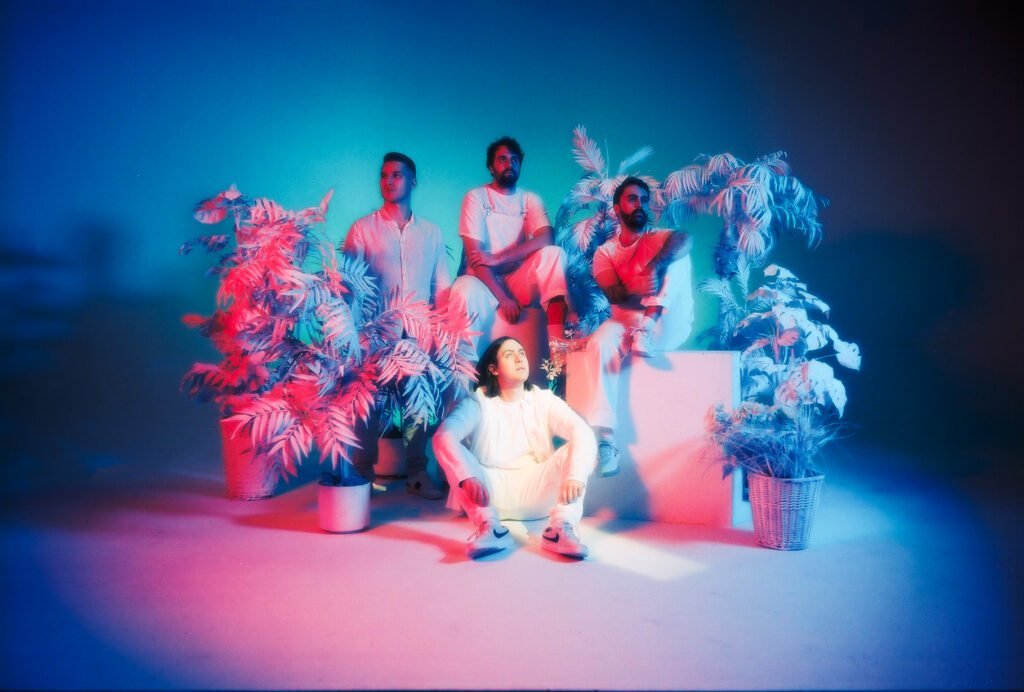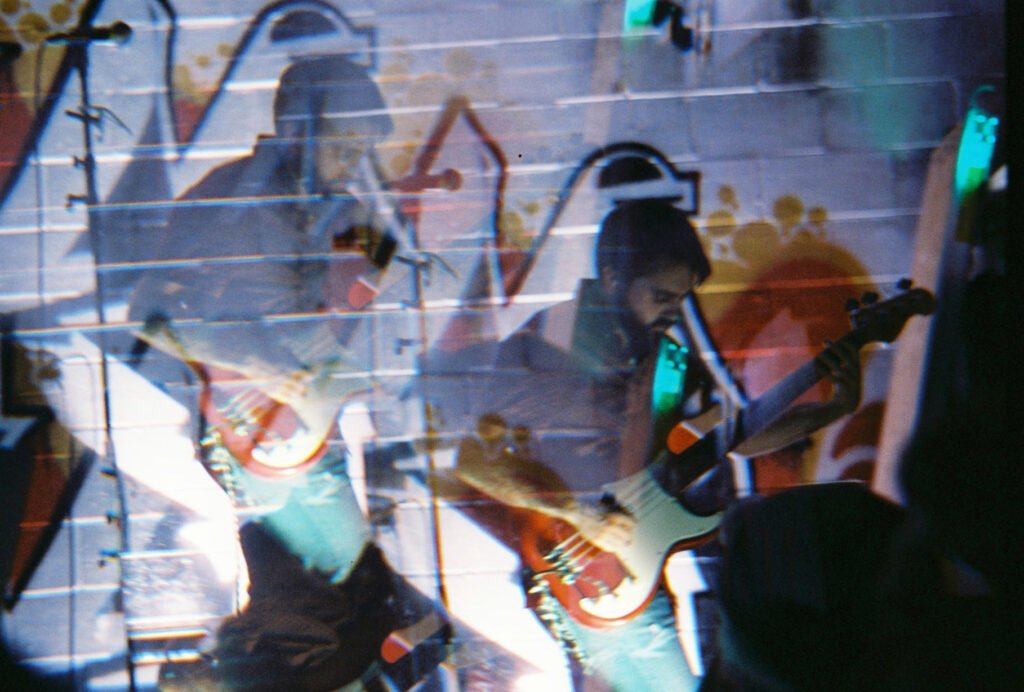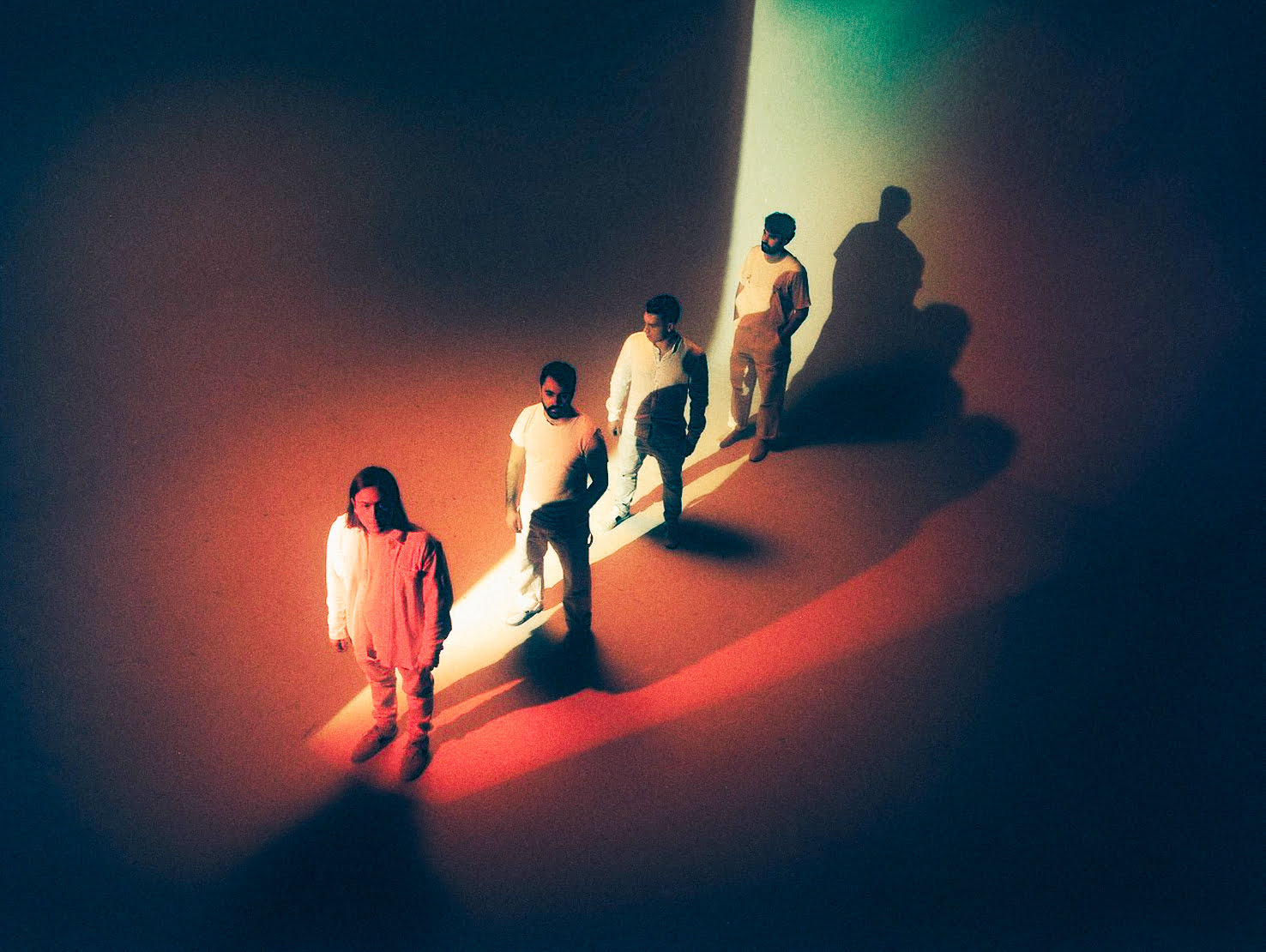Meltt is a group of four multi-instrumentalists who use psychedelic guitars, swelling synthesizers, thundering drumming, and ethereal voices to create their unique dreamscapes. The band has been hailed for its combination of strong riffs, colorful instrumentation, detail-oriented production, and multi-layered songwriting. They are currently classified as indie/psych-rock. A Meltt record or event is aimed to send the listener to places they’ve only imagined before, with equal love for the pleasantly tripped out and the powerfully crunchy corners of music. Check out the exclusive interview below:

1. Can you tell us a bit about where you all come from and how it all got started?
Meltt: Three of us all born and raised in the same small area in the North Shore of Vancouver. One of us (James P) grew up in the English countryside and moved to that same North Shore community as a young lad! Chris and I (James T) went to the same kindergarten and primary school. We played in a cover band in grade 6 and 7 in our elementary school. Ian also went to that same elementary school a year below Chris and I. In high school Chris, James P and I were in a cover band with two other members. We covered some classic rock bands like the Stones, Queen, Eric Clapton and the Beatles. We also covered contemporise artists such as Tame Impala, The Strokes, The Black Keys and Jet. After high school the cover band broke up and we all went to university. However, that summer in between high school and university James Chris and I had been jamming. James went off to Montreal for university and Chris and I stayed in Vancouver. Over this year Chris and I would play together and we would exchange demo ideas and songs with James in Montreal. In the summer after first year we decided to write and record an EP of all these songs. We had such an amazing time and felt like we wanted to really pursue this new original band we had formed and so James decided to transfer to UBC so we could all be in Vancouver. We kept writing and we soon started to play more gigs at house parties, university competitions and showcases and then around town at local bars and clubs. We had a few bassists in the band but none that were permanent. Ian joined our group shortly after we recorded Swim Slowly. He had played in some summer shows with us but as he had been going to school out east he was unable to join permanently until he came back to town. Since then our line up has been solidified and we have written a lot of new music together!
2. Did you guys have any formal training or are you self-taught?
Meltt: We all had initial formal training for a few years of both drum and guitar lessons respectively. However, since then we applied our formal training to self teach ourselves new instruments such as bass and keys. We continue to expand our musical horizons by experimenting with new synthesizers and other instruments that we have taught ourselves such as Autoharp and other percussion instruments and sampling pads.
3. Who were your first and strongest musical influences and why the name ‘Meltt?
Meltt: We all were heavily influenced as kids by the classic rock our parents would play for us. Bands such as Led Zeppelin, David Bowie, The Beatles, Queen, and all the other greats of that era made up a large part of our young musical interests and influence. As we grew up we started to appreciate the alternative and indie psych rock scene a lot. Bands such as Tame Impala, Foals, Radiohead, The War on Drugs, Tycho and Cage the Elephant became some of our favourites. They expanded our musical horizons with some groundbreaking sound and inspired us to explore new sounds ourselves. Most recently, we have been getting into more indie-pop, bands like Glass Animals and MGMT.
We had been brainstorming some names when we initially formed and when James suggested the name Meltt we loved it because it was short, easy to remember and most importantly we felt it best captured the sound and vibe of the band. We aim to create a rich soundscape that provides the dreamy sensation of melting into the music in both the slower songs but also the harder hitting ones.
4. What do you feel are the key elements in your music that should resonate with listeners, and how would you personally describe your sound?
Meltt: We want to encompass many emotions and provide a range of different vibes, tempos and sounds in our songs. We love so many different genres and types of music and this is reflected in the range of music we make; from more powerful and energetic alternative rock to chill electronic based dream pop and even some slower more emotional and melancholic tunes. I would describe our sound as a combination of heavy riffs and colourful instrumentation, with detail oriented production and multi-layered songwriting. We hope to sweep our listeners into an ethereal dream with our music. It is also very important to us to write about things that mean a lot to us that we believe our listeners can relate to as well. Nature is always a running theme in our music as it is important to us and provides the best imagery to meet emotions. Some songs are about some of our most difficult struggles and darkest times, but one of the more common themes is the ability we all have to face these moments and emerge as better people on the other side.

Meltt: We definitely cut our teeth as musicians by learning from the music we loved and by covering songs in our high school bands. Doing so gave us a basic understanding of songwriting and composition and we pretty naturally just started writing our own music after that. It wasn’t until studying at university when the band formed that we really pursued a set of demos to the end and began developing our own voice. We’re definitely drawn to the sounds of our influences when writing new songs but with each release I think we’re building a greater sense of self and carving out an aesthetic lyrically and musically that feels unique and authentic to ourselves. We also feel that in terms of being considered a “rock” band that we have so much love for different genres and artists that we never think of what we’re doing in terms of genre but just whether it resonates with us.
6. What’s your view on the role and function of music as political, cultural, spiritual, and/or social vehicles – and do you try and affront any of these themes in your work, or are you purely interested in music as an expression of technical artistry, personal narrative and entertainment?
Meltt: I think music plays a crucial role in all of those areas, however I think that for us lyrically the music has much less to do with political or social vehicles and more to do with personal journeys of discovery or observance of something rather than a direct call to action. Its our hope that our music uplifts and inspires people and that gives us the greatest satisfaction in terms of a “goal” for the music – but really we’re just trying to bring to life the sounds we love and to lyrically react to the music by speaking about the things that resonate emotionally with us.
7. Do you feel that your music is giving you back just as much fulfilment as the amount of work you are putting into it, or are you expecting something more, or different in the future?
Meltt: I feel that the fulfilment we get out of music is in doing the work and that from that point anything is a genuine bonus. Obviously we have goals and aspirations for the future of the band but they’re mainly creative goals. Ultimately we would get a lot of fulfilment by being able to make a living from music but the greatest sense of fulfilment is creating a body of work we can be proud of.
8. Could you describe your creative processes? How do usually start, and go about shaping ideas into a completed song? Do you usually start with a tune, a beat, or a narrative in your head? And do you collaborate with others in this process?
Meltt: We have various approaches to writing. Some songs are close to being fully formed demos from one of us then drums and fine tuning is added with the other members and other songs are written based off of just one guitar line or beat and then the rest is built in the room collaboratively. This was largely the mix of approaches we took for Swim Slowly. The most recent music we did in a similar way but due to the pandemic we mostly had to write separately and so there were a lot of demos we each brought in and fine-tuned. We had a collection of them that we brought to a remote cabin and spent a month there working on them. We had to write parts (chorus, bridge etc.) for some demos, change parts of others and refine others. Many of these changed a lot but some were more fully formed alone and then fine-tuned together. Once the music was composed we divided the songs amongst us to work on the lyrics individually. Once we all had initial drafts we would identify common themes and help edit each song collaboratively until they were done!
9. What has been the most difficult thing you’ve had to endure in your life or music career so far?
Meltt: In our music career the most difficult thing we had to endure was probably the pandemic and all the uncertainty it brought when it happened. In the end we actually ended up gaining a lot of fans over the past two years but at the beginning we weren’t sure if we would be able to continue or in what capacity. No one knew the future of the entertainment industry at the time so it was not a great time for us at the beginning. We also had a lot of challenges trying to write and record remotely. It was very difficult to undertake such a collaborative process so separately. Thankfully everything rebounded nicely so far and we’ve gained many fans that discovered us during the lockdown so we are very thankful.
10. On the contrary, what would you consider a successful, proud or significant point in your life or music career so far?
Meltt: The most significant point in our music careers would have to be this past year. We have finally been able to break free of many of the pandemic restrictions and start to play live music again for the first time since our music has been discovered so widely. We had been patiently waiting to do our first tour the last 2 years and we finally were able to do that in March of this year. I would say getting out of our area and playing shows across the US, where we met some amazingly dedicated fans was probably our proudest moment so far.
KEEP IN TOUCH:
INSTAGRAM | FACEBOOK | SPOTIFY | WEBSITE

